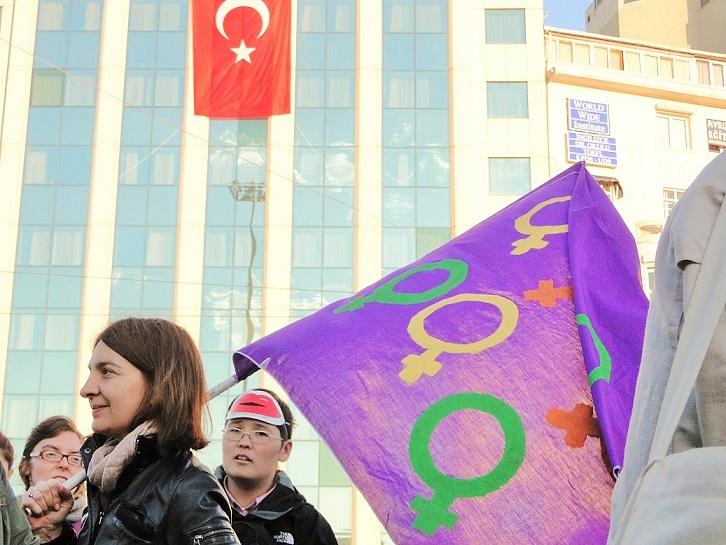On the verge of a fast approaching civil war, women in Turkey are calling for unconditional and immediate peace, and for an end to the harassment and violence against dissenting women in Turkey. As we commemorated International Day of Peace on 21st September and a call for a global ceasefire, AWID takes a look at the situation of women human rights defenders in Turkeys increasing conflict.
On 1st September, 2015, 113 women and LGBTI organizations in Turkey came together to call for an end to the armed conflict and an immediate return to the peace negotiations. Their call was addressing both the army of Turkey and the PKK (Kurdistan Workers’ Party), when they said loud and clear “Set aside arguments of who’s right and who’s wrong, get past the blame of “who started it” and just STOP!”
Women of Turkey have always been at the forefront of the peace and human rights struggle, although not granted the credit and visibility until the Gezi Park protests of summer 2013. The women’s movement advocating peace, gender justice and comprehensive democratic reform was, and still is, carried out at great risk.
A gender analysis of “dissent” in Turkey clearly illustrates that if it is a woman who dares to speak out, the repercussions and punishment are far more malicious, multi-faceted and detrimental to her social, economic and political wellbeing, compared to the treatment of male activists. Turkey is used to heroising its male freedom fighters, with some, including Deniz Gezmiş, Mahir Çayan, Abdullah Ocalan iconised to an almost fetishist extent. While this in no way belittles the meaningful contributions of male activists to the human rights struggle of Turkey, it illustrates that the face of the movement(s) is paternalistic, male-driven, and invisibilises the evocative inputs of women.
A pattern of violence again dissenting women
On August 15th Turkey was shocked by the image of the dead body of a women stripped naked, tortured and left in broad daylight. Three men, allegedly members of Turkey’s special forces, stood around the naked body of the dead woman. Kevser Elturk, code name Ekin Van, was a member of the armed wing of the Kurdish struggle, Kurdistan Workers’ Party (PKK), murdered during clashes on August 10th, and put on public display.
Another emblematic case that demonstrates the worrying pattern is that of Pınar Selek, an internationally recognized feminist activist, sociologist and academic known for her research and advocacy on human rights for ethnic and sexual minorities. Over the course of 16 years, Selek has been charged with terrorism and accused of being involved in an explosion. The Government appointed experts who have concluded multiple times that Selek had no involvement in the explosion; and she has been acquitted four times. Selek was judicially harassed in what appears to be a blatant attempt to destabilize her work.
During the Gezi Park protests that swept the nation in the summer of 2013, dozens of women activists reported that they were either sexually assaulted or threatened with gang rape whilst in police custody. A woman named Pınar who was an innocent bystander in Beşiktaş—and not participating in the protest—but was taken into police custody, was told to take off her clothes, and punched in the face when she resisted.

The cold blooded way in which Ekin Van was murdered needs to be recognized for what it is—part of a pattern in how dissenting women are treated in Turkey. The government of Turkey systematically attacks and threatens women who dare to criticize official government policy in a way that is very different from the way it treats dissenting men. The gender dynamics of handling dissent are made apparent in the remarks of President of Turkey, Recep Tayyip Erdoğan, who publicly stated that he doesn’t believe in gender equality, and actively targets women who speak up for human rights and gender equality.
Gender based public attacks of Erdoğan are not limited to these particular cases. Referring to a woman protestor whose hip was broken due to heavy police violence during a protest in Hopa on 31 May 2011, he said “It is not clear whether she is a girl, or a woman” during a mass rally. The implication was that the woman protestor was not a virgin. The same patriarchal tone was reiterated when Erdoğan called prominent local journalist Amberin Zaman “a shameless woman” and ordered her to “know her place” due to her critical reporting before Presidential elections of 2014.
Women’s bodies used to silence dissent
Turkey is a difficult country for anyone with an independent, critical voice; more so if that voice is calling for democracy and human rights. However, the consequences for being a human rights advocate are gravely different for men and women. The bodies of male dissenters are not displayed naked for all to see. Men are not threatened with gang rape. Men’s right to be in the public space is not questioned. Unlike women who have taken part in protests until late, who are questioned by police as to why they are out so late at night.
What does it mean when a woman is left stripped naked for the world to see her tortured body and the life that was taken away from her? It sends a clear message to all women of Turkey about what will happen to them if they dare to dissent, criticize and take action against government repression. The Turkish government is attempting to silence us all through a systematic discourse of rape, murder and torture.
This is why the call of a collective of women and LGBTI organizations sends such a moving and meaningful message. Above all it means women of Turkey are not afraid of carrying out a struggle they deem legitimate. Ekin Van and other women calling for political reform, Kurdish, Turkish or others, are all sisters in the same struggle.
